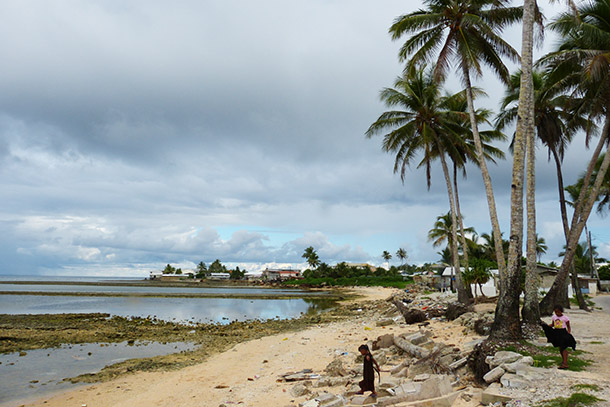For the 16 nations that are member to the Pacific Islands Forum (PIF), climate change is not a hypothetical problem, but a looming crisis. Their Heads of State are gathering this week in Majuro, the capital of the Marshall Islands, to adopt the Majuro Declaration for Climate Leadership.
If they succeed in getting an ambitious agreement, they will help inject a much-needed sense of urgency into the UN climate negotiations. This is by no means a done deal given that two industrialized countries -- Australia and New Zealand -- are members.

Majuro Atoll on the front lines of climate change, Creative Commons: Kelly Rigg, 2013
The Forum is being hosted by the Marshall Islands, a country whose people have already faced down an existential threat emanating from beyond its borders. U.S. nuclear tests on Bikini Atoll in the 1940's and 50's left a devastating legacy of cancer and contamination. In 1985, the people of Rongelap Island in the northern part of the country went so far as to seek the help of Greenpeace to relocate them to a new home free from radioactive contamination.
Whether the people of the Marshall Islands and many other Small Island States will ultimately be forced by climate change to leave their homes in search of higher and safer ground, depends largely on the actions we take -- the decisions that governments make -- in the next few years.
I was therefore honored to be invited to participate on an experts panel immediately preceding the Forum, speaking about public mobilization and how to spark a new wave of political momentum for an ambitious global agreement in 2015. And while the concept of political momentum may sound like an oxymoron to those familiar with international climate discussions, there is actually much new momentum to speak of outside of the political arena.
The science underpinning human-caused climate change grows more robust by the day, public opinion is galvanising in the wake of terrible extreme weather events, people are mobilizing against coal, tar sands and other high carbon infrastructure, and, as we are seeing with the exploding market for renewables, the economics are rapidly shifting in favour of clean energy over fossil fuels.
But a new wave of political momentum is still sorely needed, and I sincerely hope that the Majuro Declaration can help do the trick. Progress at the United Nations climate negotiations has been slow and incremental despite the very real environmental, social and economic impacts already being experienced in many countries. And the upcoming fifth assessment report of the IPCC will paint a grim picture of the impacts these countries will face, including but not limited to sea level rise, in the coming decades.
The world has already warmed 0.8° C from pre-industrial levels, enough to trigger sea level rise by as much as one meter by the end of this century. This is a given. And it translates to economic losses in the $60 billion range per year by 2050 as flood surges inundate coastal cities. Given that more than a billion people live in low-lying coastal areas, just imagine what will happen as temperatures, and sea level, continue to rise.
And while the economic cost is high and growing for the U.S., China, India (and other countries with cities in the top 20 under threat from sea level rise) the costs to society go far beyond money. For small countries such as Kiribati, Tuvalu, the Marshall Islands and many others, the rising tide may wash away the only homes their people have ever known.
This is the backdrop for the discussions that will take place at the Forum over the next few days. The Majuro Declaration is expected to recognize the complete insufficiency of current efforts to address climate change, and the responsibility of all to act urgently to phase-down greenhouse gas pollution. It will recognize that the Pacific Islands as a region already have ambitious plans to transition away from fossil fuels and will call on others to follow their lead.
Though the sum total of their emissions reductions will be small relative to the pollution output of giant economies like the United States, China and India, they are symbolically very powerful. The spirit of the agreement is to reframe the "I won't move till you move first" stance many world governments continue to hold, to one of "I'm moving and I invite you to move with me."
Its authors have described the declaration as the Pacific's gift to the world. Let's stand with them and accept their gift with open arms. And then let the rest of the world reciprocate in kind.
